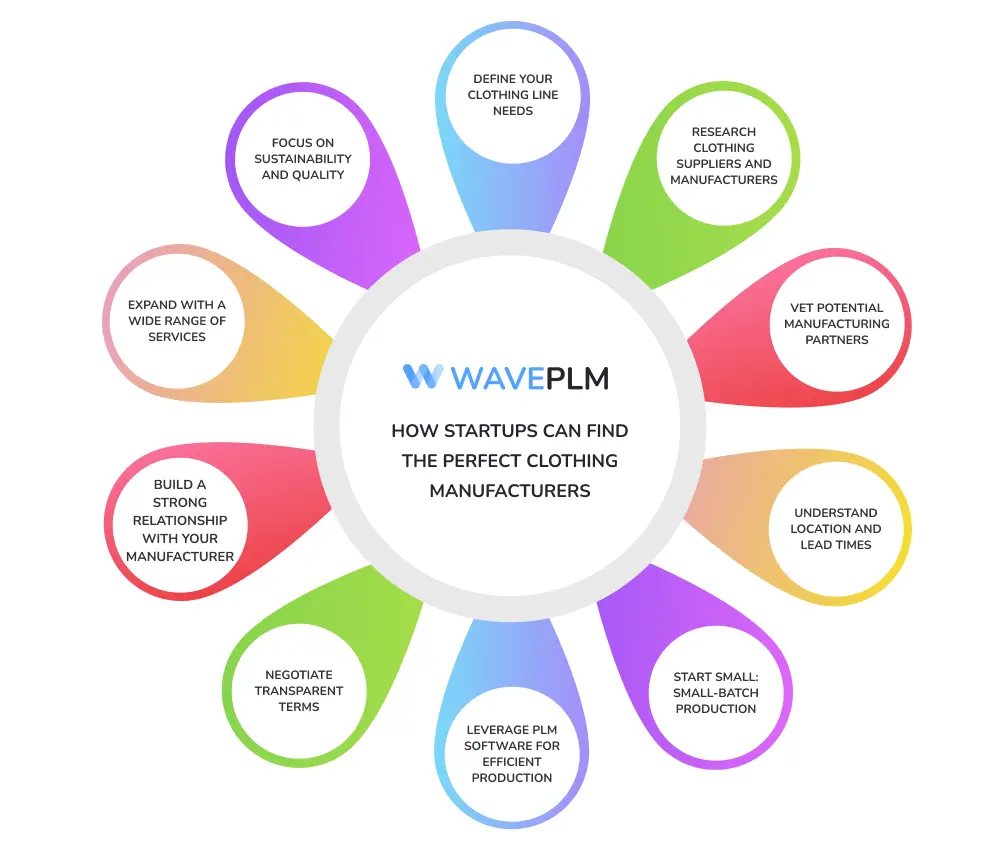
Finding the right clothing manufacturer is one of the most critical steps in launching a successful clothing brand. Your choice of manufacturing partner can impact everything, from product quality to production timelines. Whether you’re building a small-batch clothing line or a fashion brand aiming to scale, following the right steps can make all the difference. Here’s a detailed guide to help startups navigate the world of clothing manufacturers, custom apparel manufacturers, and clothing suppliers.
1. Define Your Clothing Line Needs
Before you start searching for manufacturers, clarify your clothing brand’s needs.
- Product Details: Decide on the type of clothing products you want to produce. Are you launching a line of casual wear, activewear, or formal attire?
- Quantities: Startups often produce small quantities, so look for manufacturers that support small-batch production.
- Customization: Do you need a custom apparel manufacturer who offers services like screen printing, embroidery, or cut and sew?
By outlining these details, you’ll have a clear idea of what to look for in a quality clothing manufacturer.
2. Research Clothing Suppliers and Manufacturers
Finding a reliable custom clothing manufacturer takes effort, but online platforms can simplify the process.
- Directories: Explore directories like Makers Row, Sewport, or Kompass to find clothing suppliers catering to startups.
- Trade Shows: Attend industry events to meet potential manufacturing partners in person.
- Referrals: Reach out to other startups or fashion brands for recommendations.
Look for manufacturers who provide a wide range of services, such as fabric sourcing, pattern making, and full-scale production processes. This ensures they can meet your needs as your clothing line grows.
3. Vet Potential Manufacturing Partners
Not all clothing manufacturers for startups are created equal. Before committing to a partner, evaluate their capabilities:
- Request Samples: Ask for product samples to assess the quality of their manufacturing processes. Pay attention to stitching, fabric quality, and overall finishing.
- Check Reviews: Look for reviews or testimonials from other clothing brands they have worked with.
- Assess Specializations: Ensure the manufacturer specializes in the type of clothing products you plan to produce. For example, some manufacturers excel at cut and sew, while others focus on screen printing or other customization techniques.
This due diligence will help you identify high-quality clothing manufacturers that align with your brand’s vision.
4. Understand Location and Lead Times
The location of your custom apparel manufacturer can significantly affect your production process.
- Domestic Manufacturers: These often offer quicker lead times and easier communication. They are ideal for startups focusing on high-quality clothing and faster turnaround.
- Overseas Manufacturers: While often more cost-effective, overseas options can present challenges like longer shipping times and potential communication barriers.
Evaluate the trade-offs between cost savings and convenience. Choose a partner that aligns with your clothing line’s priorities.
5. Start Small: Small-Batch Production
Many startups begin with small-batch production to minimize risks and manage costs. Look for manufacturing partners who cater to small quantities without compromising quality.
- Advantages: Small-batch production lets you test your designs and gauge customer demand without overcommitting.
- Flexibility: This approach allows you to refine your clothing products based on feedback before scaling.
By starting small, you can establish a solid foundation for your clothing brand while maintaining flexibility.
6. Leverage PLM Software for Efficient Production
Efficient management of your production process is key to success. Product Lifecycle Management (PLM) software can simplify this task.
- Streamlined Collaboration: Use PLM software to manage your designs, materials, and timelines in one platform.
- Error Reduction: Track every stage of the production process to avoid costly mistakes.
- Scalability: PLM tools are invaluable as your fashion brand grows and your operations become more complex.
Integrating PLM software ensures smooth communication with your clothing suppliers and manufacturing partners.

7. Negotiate Transparent Terms
Clear communication is essential when working with quality clothing manufacturers. Negotiate all terms before signing a contract.
- Minimum Order Quantities (MOQs): Ensure the manufacturer can accommodate small quantities if you’re producing a limited clothing line.
- Pricing: Understand the full cost, including any additional charges for services like screen printing or custom tags.
- Timelines: Confirm production timelines to align with your clothing brand’s launch schedule.
Transparency in these areas ensures a smooth partnership and minimizes surprises during production.
8. Build a Strong Relationship with Your Manufacturer
A successful partnership with a custom clothing manufacturer goes beyond contracts.
- Regular Communication: Stay in touch throughout the production process to address any issues promptly.
- Feedback: Provide clear feedback on samples and finished products to maintain high-quality clothing standards.
- Long-Term Collaboration: Treat your manufacturer as a partner. Building trust can lead to better terms and priority service as your clothing brand grows.
9. Expand with a Wide Range of Services
As your clothing line scales, you may need a manufacturer offering a wide range of services. Look for partners who can support your growth with capabilities like:
- Fabric Sourcing: Access to unique and sustainable materials.
- Pattern Development: Professional pattern-making services for consistent production.
- Custom Features: Options like cut and sew, screen printing, and embroidery to enhance your designs.
A versatile manufacturer ensures your brand can adapt to changing trends and customer preferences.
10. Focus on Sustainability and Quality
Modern consumers value sustainability. Partner with quality clothing manufacturers who prioritize ethical practices.
- Sustainable Practices: Opt for manufacturers using eco-friendly materials and processes.
- High-Quality Standards: Ensure your clothing products meet the expectations of your target audience.
Sustainable practices not only benefit the planet but also enhance your fashion brand’s reputation.

Conclusion
Finding the perfect clothing manufacturer for your startup requires careful planning and research. Start by defining your clothing line’s needs and researching potential manufacturing partners. Vet them thoroughly to ensure they can meet your standards for high-quality clothing.
Leverage tools like PLM software to streamline your production process and build strong relationships with your partners. Whether you’re producing small batches or planning to scale, these steps will help your clothing brand succeed.
By working with reliable clothing manufacturers, suppliers, and custom apparel manufacturers, you can bring your vision to life and grow your brand with confidence.





Leave a Reply